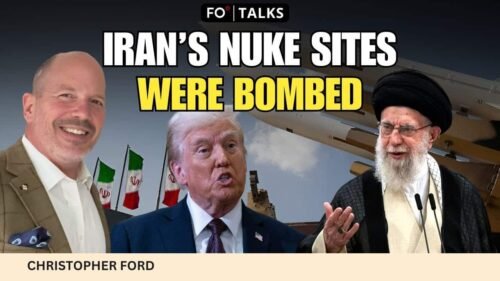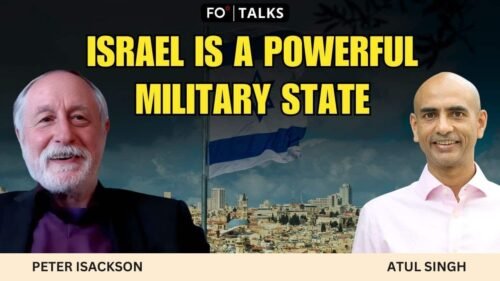Fair Observer Founder’s Video Producer & Social Media Manager, Rohan Khattar Singh, talks with Steven Zunes, director of Middle Eastern Studies and professor of politics at the University of San Francisco. They analyze the US–Israel–Iran relationship and its broader implications. Zunes traces Washington’s hostility toward Tehran, Iran, to the 1979 Iranian Revolution that overthrew the Shah, Mohammad Reza Pahlavi. He was a US ally installed with CIA support in 1953.
For decades, US policy debates have been split between Democrats favoring diplomacy and sanctions, and Republicans or hawkish Democrats backing direct military measures. Although US President Donald Trump campaigns against “never-ending wars,” Zunes argues his administration shows readiness to back action against Iran, either directly or via Israel, calling recent US-supported airstrikes on Iranian territory a “dangerous escalation” that risks destabilizing the wider region and provoking further retaliatory cycles.
He stresses that such strikes violate the United Nations Charter, which permits force only in self-defense or with Security Council approval. Customary international law allows for preemptive military action, but it is narrowly defined. Zunes maintains that Iran is “years away” from a bomb.
He also criticizes Trump’s disregard for US constitutional requirements, noting that offensive operations require Congressional approval under the Constitution and the War Powers Act of 1973. On Trump’s push for a new Iran deal, Zunes says abandoning the Joint Comprehensive Plan of Action (JCPOA) undermines credibility. This agreement from the era of US President Barack Obama makes it “physically impossible for Iran to develop a nuclear weapon.” In Zunes’s view, Trump’s claim that he can negotiate better terms is “naive or disingenuous,” reflecting a strategy to weaken Iran rather than resolve the nuclear dispute.
Iran’s foreign ties and nuclear ambitions
Zunes describes Iran’s growing links with Russia and China, including arms sales to Russia and oil exports to China, as an “alliance of convenience” rather than an ideological partnership. He doubts these relationships will significantly alter the regional balance, noting that both powers see Iran as a problematic partner with its own agenda and internal contradictions.
On the nuclear question, Zunes says there is “no indication” Iran has decided to build a warhead, though it began enriching uranium beyond JCPOA limits after the US withdrawal. He recalls Iran’s earlier weapons research in the late 1990s and early 2000s, largely driven by fears of Iraq, but says there is no evidence of such work since.
Zunes warns that bombings could convince Iranian leaders they need a deterrent, citing Iraq’s invasion after disarmament versus North Korea’s survival with nuclear arms. He calls Iran’s civilian nuclear program “unnecessarily provocative” given its energy resources and ability to import nuclear materials for peaceful purposes. While Western responses are aggressive, he says Iran could take steps to ease tensions and signal a genuine interest in reducing hostilities.
National pride, regional role and Gulf state positions
Even Iranians who oppose the regime, Zunes says, resent being singled out when other regional states possess nuclear weapons. He believes recent conflicts strengthen hardliners and weaken opposition movements that struggle to organize under restrictive conditions.
In the Gulf, Saudi Arabia, the United Arab Emirates and Qatar oppose Iran’s nuclear ambitions but remain wary of military escalation, recognizing that war could destabilize the region and threaten vital shipping routes. These monarchies, Zunes argues, take a more pragmatic approach than Washington, accepting Iran’s influence and acknowledging the need for negotiation.
Israel–Iran tensions and strategic calculations
Zunes notes Israel’s recent strikes across the Middle East and the damage caused by Iranian missile attacks — a rare experience for Israeli cities. While some Israeli leaders may prefer caution, he identifies hardliners who benefit from prolonging the Iran crisis, as it shifts international focus from Gaza and alleged Israeli war crimes. These hawks often frame the confrontation as existential in order to consolidate domestic political support and deter compromise.
Zunes predicts an ongoing pattern of low-level confrontation rather than a large-scale war.
The Palestinian question and the shifting debate
The Israel–Iran conflict diverts attention from Gaza, where Zunes has long supported a two-state solution. He argues that settlement expansion and US backing make such a solution increasingly impossible, shifting the conversation toward an apartheid framework. Citing major human rights organizations, he says Israel’s system meets the legal definition of apartheid and warns that unconditional US support may face growing political resistance, particularly among younger Americans and within some progressive movements.
Zunes maintains that arguments should be rooted in universal human rights and international law rather than ideology. Continued settlement expansion, he warns, harms Palestinians, fuels extremism and undermines the global legal order.
This erosion of the rules-based order produces ripple effects far beyond the Israel–Palestine context, weakening the credibility of international institutions in conflicts from Ukraine to the Western Sahara. In the US, he sees a widening divide between the political establishment and grassroots activists, with the latter increasingly vocal in demanding conditional aid and sanctions.
European allies, while slower to shift their stances, face internal pressure from civil society and political opposition parties to align policy with human rights law rather than strategic expedience. These dynamics, Zunes suggests, could reshape the diplomatic landscape over the next decade.
While he fears it may be too late for a two-state solution, he insists that international law must guide all discussions.
[Lee Thompson-Kolar edited this piece.]
The views expressed in this article/video are the author’s own and do not necessarily reflect Fair Observer’s editorial policy.











































Comment